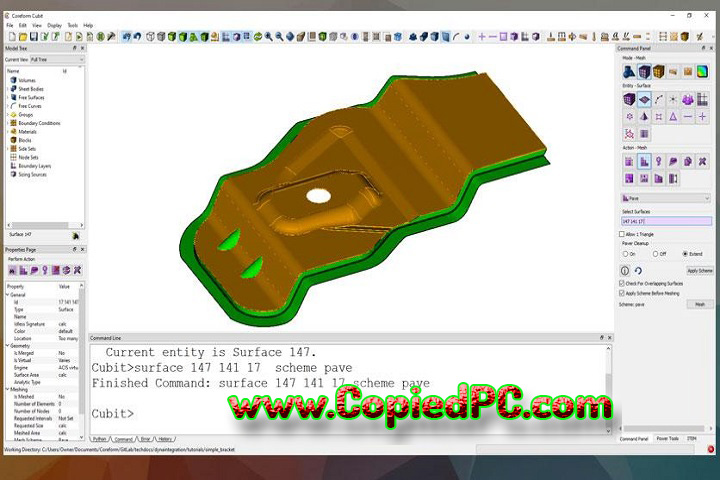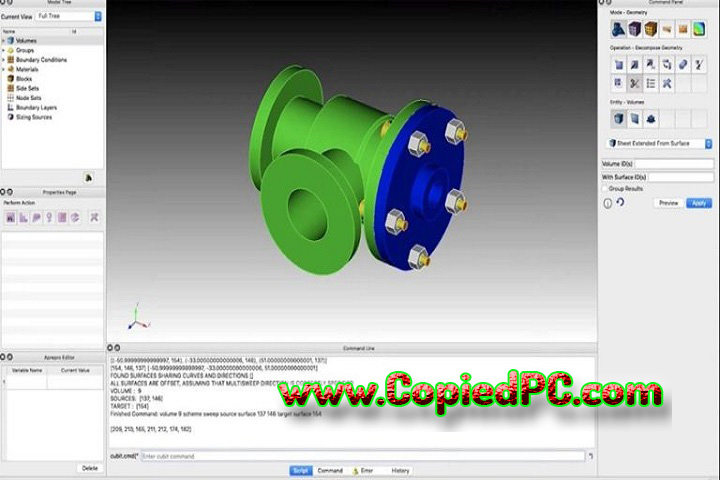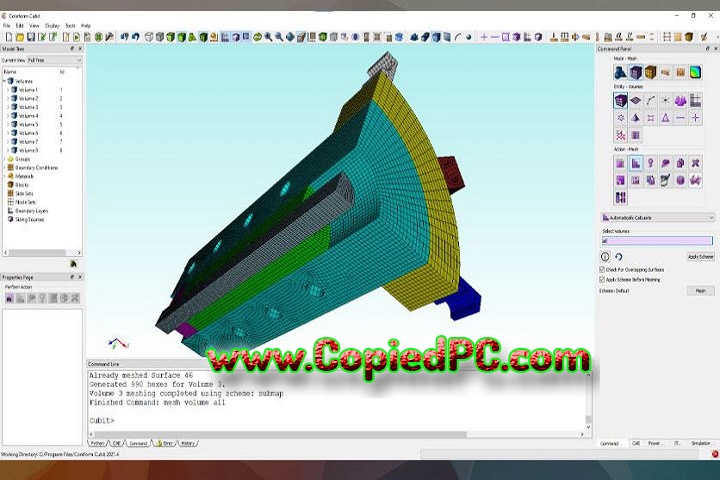Coreform Cubit : Version 2025.1.0 (x64) (Software)
Introduction:
Coreform Cubit : Version 2025.1.0 (x64) (Software). Within the domain of computer-aided engineering (CAE) and finite element analysis (FEA), the process of mesh generation plays a pivotal role as it directly affects the accuracy and performance of the simulation. Coreform Cubit 2025.1.0 (x64) is a leading software solution that tackles the difficulties with a highly advanced and powerful meshing engine tailored specifically for sophisticated simulations. Presented by Coreform LLC, this is not merely a mesh generator—rather, a powerful pre-processor tool engineered for engineers, scientists, and researchers in mechanical, aerospace, automotive, civil engineering, and other technologically advanced sectors.

As the newest release in Coreform’s roster of meshing products, Cubit 2025.1.0 offers a number of improvements in performance, usability, and feature set, making it more flexible than ever. Incorporating smoothly into FEA workflows as well as handling both structured and unstructured mesh types, Cubit 2025.1.0 offers a full solution for constructing high-quality meshes on complex geometries as well as for running simulations.
You may also like :: StaxRip : Version v2.44.4 (x64)
Description:
Coreform Cubit 2025.1.0 (x64) is a commercial meshing tool used mainly for creating 2D and 3D finite element meshes. It is used by users to pre-process complex models by importing geometries, cleaning them, and generating high-quality meshes that can be used in simulation tools such as ABAQUS, ANSYS, LS-DYNA, etc.
Coreform Cubit differentiates itself by combining control with automation. Many meshers sacrifice ease-of-use for customization, or vice versa. Cubit strikes a middle ground where users can write complex workflows using its high-function command-line environment or Python API, yet also enjoy a friendly graphical user interface (GUI).
Version 2025.1.0 brings updates that refine mesh accuracy, improve model preparation, and ensure greater compatibility with CAD tools and simulation programs. It provides support for high-order meshing based on isogeometric analysis (IGA) principles, which can be especially useful for gaining higher accuracy in simulation with minimal increase in mesh density.

Overview:
Cubit 2025.1.0 is not just a mesh generator; it is a bridge that takes raw CAD geometry to simulation models. Engineers may sometimes struggle with issues such as corrupt CAD files, bad surface definitions, or ill-suited geometry. Cubit has solutions for such issues by featuring powerful tools for repairing the geometry, defeaturing features, and mesh quality improvement methods.
You may also like :: Anthemion Jutoh : Version 3.22.4
The program integrates:
Hexahedral, tetrahedral, and hybrid mesh generation
Geometry decomposition and clean-up.
Meshing of complex parts in volume
Boundary layer mesh generation for CFD
====================================
Mesh sizing and mesh grading control
Parallel processing and scripting support:

One of the most powerful features of Cubit is its high level of integration with simulation codes. Its users can output meshes in a variety of formats supported by many solvers. Cubit also supports spline-based as well as NURBS mesh strategies well-suited to advanced isogeometric analysis—an increasingly popular new method in computational mechanics.
Cubit is applied in practice in fields like:
Structural mechanics
Crash simulation
Thermal analysis
Fluid dynamics
Nuclear engineering
You may also like :: AnyRail : Version 7.51
Aeronautical component design
The newest release, 2025.1.0, draws on a successful track record with new tools for automation, enhanced surface mesh algorithms, and enhanced scripting and batch handling support, allowing users to work with increasingly large models and iteration on designs repeatedly.
Software Features:
Coreform Cubit 2025.1.0 is full of features intended to accelerate mesh creation, improve accuracy, and increase flexibility:
1. Advanced Geometry import and cleanup
Support import of major CAD formats such as STEP, IGES, ACIS, and Parasolid.
Geometry cleanup operations involve tolerance fixing, merging, suppression, and decomposition.
Defeaturing eliminates unwanted geometric features that cause interference in meshing.

2. High-Quality Hex and Tet Meshing
Support for both structured (hex) and unstructured (tet) meshing.
Automatic and manual control of mesh quality.
Boundary layer meshing for precise simulation of fluid flow close to surfaces.
3. Powerful Scripting and Automation
Command-line interface with scripting capabilities.
Python API for automating repetitive tasks and workflow integration.
Batch meshing option for executing scripts for multiple models or in HPC.
4. Support for Isogeometric Analysis (IGA)
Support for native spline-based geometric representation.
Higher-order curved meshing with NURBS and T-splines
Specially suited for sophisticated simulations demanding geometric accuracy.
5. MESH OPTIMIZATION AND VALIDATION
Mesh smoothing, refinement, and quality checks.
Visualization tools used to find and correct poor elements.
Support for mesh extrusion, mapping, and sweeping methods.
6. User Interface and Visualization
Modern GUI containing interactive 3D view.
Object browser, entity highlight, and selection filters.
Customizable color schemes on the mesh.
7. Export to Multiple Simulation Formats
Direct export to ABAQUS, ANSYS, LS-DYNA, NASTRAN, OpenFOAM, and more.
Options to specify boundary conditions and material properties at export.
Mesh compression and lightweight formats to enable quicker file handling.
8. Parallel and HPC Support
Multithreading for accelerated mesh creation.
Support for distributed meshing operations.
Integration with Linux-based compute environments.
System Requirements:
Coreform Cubit 2025.1.0 needs a 64-bit system to run optimally with the following minimum and recommended system configurations:
Minimum System Requirements:
Operating System: 64-bit Windows 10/11 or Linux (Ubuntu/C
Dual-core 64-bit AMD or Intel processor
8 GB RAM
Graphics: Dedicated or integrated GPU with support for OpenGL 3.3
Disk Space: 5 GB of free hard disk space.
Display: 1280×1024 resolution
Recommended system requirements: Operating System: Windows 11 Pro or Linux (the most recent stable release) Processor: Quad-core Intel i7 or AMD Ryzen 7 and above. 16 GB of RAM or higher. Graphics: 2 GB dedicated GPU (either NVIDIA Quadro or AMD Radeon Pro) Disk Space: At least 20 GB of free space on an SSD for bigger projects Display: 1920×1080 or higher Note: The performance of Coreform Cubit can depend on the model complexity and mesh size. Those with very large assemblies or high-resolution meshes can find performance gains with 32+ GB systems as well as high-end GPU solutions.
Download Link : Here
Your File Password : CopiedPC.com
File Version & Size : 2025.1.0 | 711 MB
File type : compressed/Zip & RAR (Use 7zip or WINRAR to unzip File)
Support OS : All Windows (64Bit)
Virus Status : 100% Safe Scanned By Avast Antivirus